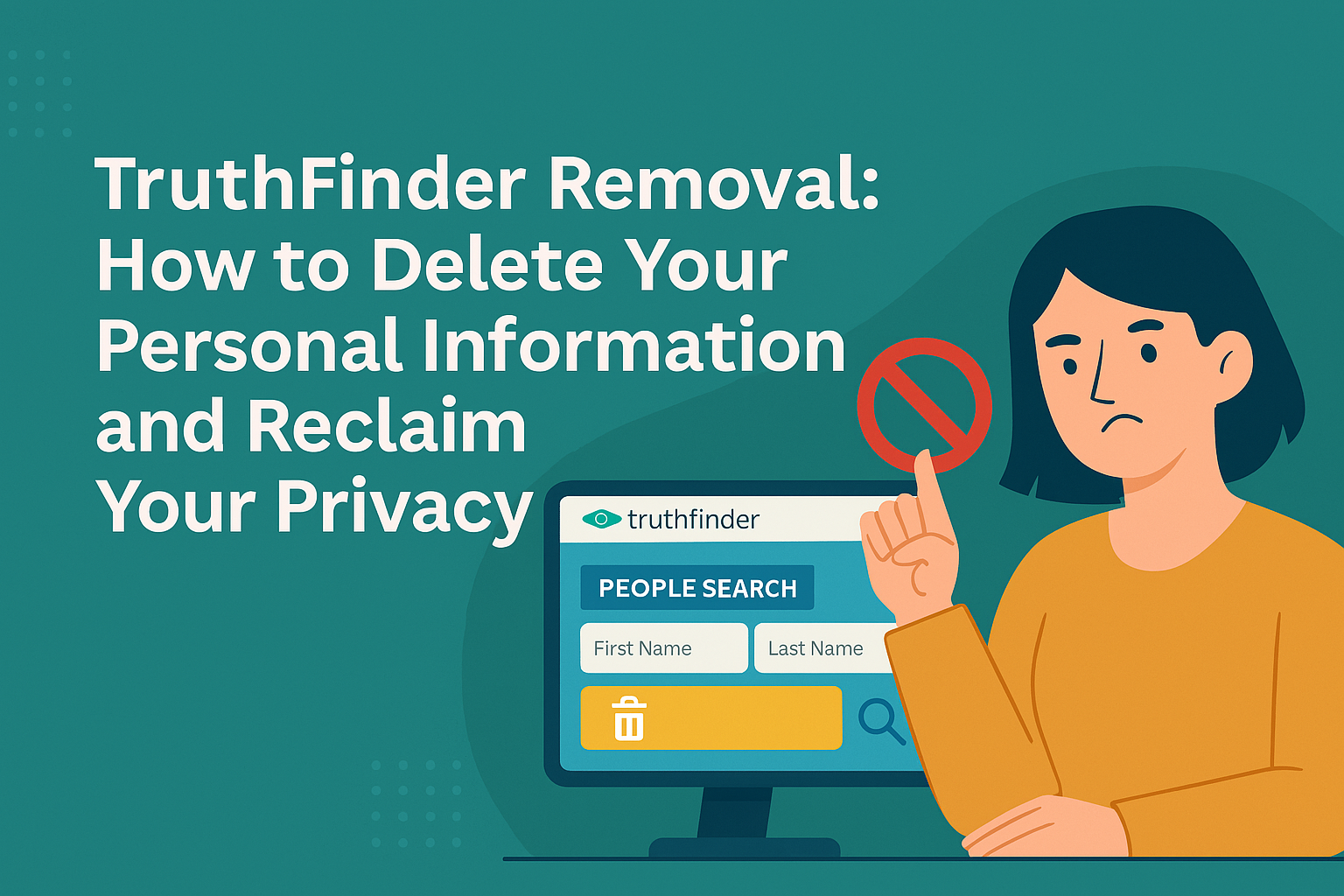Estimated reading time: 4 minutes
How to Opt-Out of TruthFinder
Why Is TruthFinder a Privacy Risk?
TruthFinder is a public records aggregator. It pulls personal data—such as full names, addresses, phone numbers, relatives, criminal history, and more—from various public and semi-public sources and packages it into easily accessible background reports.
While these services market themselves as tools for transparency and safety, they can pose a serious risk to privacy, safety, and reputation. Identity thieves, stalkers, or even employers and neighbors can misuse this data.
What Kind of Information Does TruthFinder Display?
TruthFinder profiles may include:
- Full name and aliases
- Current and previous addresses
- Phone numbers and email addresses
- Known relatives and associates
- Criminal and arrest records
- Social media accounts
- Property ownership
- Work history
Most of this data is collected without your consent.
Step-by-Step Guide: How to Remove Info from TruthFinder
Step 1: Visit the Official Opt-Out Page
Start by visiting the TruthFinder opt-out form. This page allows users to submit a request to remove their data from the site.
⚠️ Important: You will need access to a valid email address to confirm the removal request.
Step 2: Search for Your Listing
Enter your full name, city, and state. The system will return matching profiles. Scroll through until you find your listing.
Step 3: Select the Correct Record
Once identified, click “Remove This Record.” Be sure to verify all the information before submitting.
Step 4: Confirm via Email
TruthFinder will send a confirmation link to the email you provided. Clicking this link completes the opt-out process.
How Long Does It Take to Remove Info from TruthFinder?
Most removals are processed within 24 to 48 hours after email confirmation. However, data may reappear over time due to periodic database updates.
Why Does My Info Keep Reappearing?
TruthFinder routinely updates its data sources. Even after an opt-out, information may resurface if:
- New data becomes publicly available
- You move or change your name
- Other people-search sites syndicate your data
To keep your data off, you’ll need to monitor and repeat removals as necessary.
What to Do If the Removal Fails
If your opt-out fails, try the following:
- Clear your browser cache and try again
- Use a different browser or incognito mode
- Contact TruthFinder support directly at: support@truthfinder.com
Still stuck? Consider hiring a reputation management firm like Defamation Defenders to handle complex removals across multiple sites.
Should You Remove Yourself from Other People Search Sites?
Absolutely. TruthFinder is just one of dozens of people-search databases. Others include:
- Spokeo
- MyLife
- Whitepages
- BeenVerified
- Intelius
- Radaris
- PeopleFinders
Each of these sites has a separate opt-out procedure.
🔗 Learn how to remove yourself from people search sites
The Role of Defamation Defenders
TruthFinder removal can feel like a game of whack-a-mole. That’s why many choose Defamation Defenders to manage their data privacy and online reputation. Our solutions include:
- Bulk opt-out from 50+ people-search databases
- Monitoring to prevent data resurfacing
- Legal takedown letters when required
- Reputation restoration with SEO strategies
✅ Request a free privacy consultation today to take back control of your online identity.
Legal Concerns with TruthFinder Listings
Is It Legal for TruthFinder to Publish My Data?
Unfortunately, yes. The data is typically public record. However, the Fair Credit Reporting Act (FCRA) prohibits use of such information for employment, credit, or housing decisions without consent.
Can You Sue TruthFinder?
You may have a case if:
- The data caused actual harm
- TruthFinder violated FCRA or state-specific privacy laws
- You’re a California resident under the California Consumer Privacy Act (CCPA)
Tips to Prevent Future Exposure
- Set Google alerts on your name
- Use a reputation monitoring service
- Avoid linking your personal phone/email to public accounts
- Opt-out of people-search databases regularly
- Avoid registering websites or domains in your personal name
Frequently Asked Questions
Yes, but it can be intrusive. It pulls from public records to create background reports.
Typically 24 to 48 hours after confirming via email.
Yes, TruthFinder updates its database periodically, so regular monitoring is essential.
No. It’s effective only until the system refreshes its data sources.
Yes, the basic opt-out process is free. Professional help may be needed for broader or persistent cases.
No phone line is available. You must email support@truthfinder.com for assistance.
Related Content that You Might Find Useful:



